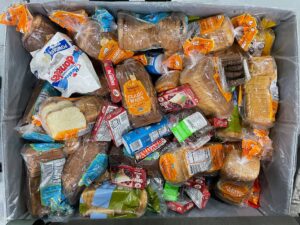October 17, 2024
In this blog: Why Depackaging Matters | How Depackaging Works | Optimizing Diversion with Depackaging & Measurement | Your Partner in Innovation
Summary: This post explores the environmental challenges of depackaging wasted food: why it matters, how it works, and how Divert is innovating the technology and infrastructure to solve wasted food at scale.
One of the biggest environmental challenges of managing wasted food is contamination and packaging. If we want to keep wasted food out of landfills and effectively capture the energy and nutrient value for beneficial uses, then responsibly removing contamination and microplastics through state-of-the-art depackaging technology is crucial. Choosing a waste diversion solution with a sophisticated depackaging program also has significant operational benefits for waste generators, such as retail grocery stores: it eliminates the need for on-site removal, saving time and resources, while providing them with product-specific data for identifying trends on their waste.
In this post, we’ll explore depackaging wasted food: how it works, why it matters, and how Divert has innovated a depackaging solution that is setting a new standard in the market.
Depackaging: The Key to Quality Diversion
Before wasted food can be recycled into renewable energy or compost, it needs to be separated from its plastic packaging, which comes in an almost infinite variety of materials, shapes, weights, and densities, from tiny produce stickers to airtight cucumber sleeves, mesh produce bags, plastic jugs, and everything in between.
Almost all packaging is a contaminant that cannot be broken down or recycled in aerobic or anaerobic processes. Even the ASTM-compliant compostable plastics are considered by some experts to be a contaminant. Plastic that doesn’t get completely removed from wasted food material contaminates soil amendments such as compost or fertilizer.
- What happens if plastic is composted with wasted food? The majority of plastic material cannot degrade in the composting process the way that food material can, but instead breaks down into smaller and smaller pieces of plastic. A study released in February 2024 by the Composting Consortium found that plastics contamination continues to be a significant challenge for the industry, with nearly half of composters in the study had trace amounts of conventional flexible plastic in their finished compost. Based on a test conducted by Divert’s own team, one cubic yard of compost containing one cup’s worth of microplastics can spread over one acre of land; on a 240-acre farm, that could equate to approximately 240 yards of soil contaminated with microplastics.
- What happens to plastic during anaerobic digestion? Anaerobic digestion is the process by which microbes break down matter in an oxygen-deprived environment to produce biogas for renewable energy, biomass for fertilizer, and water. Plastics that go through anaerobic digestion do not biodegrade into methane or carbon dioxide, but will be grouped in with biomass if not properly separated, thereby contaminating the fertilizer.
Microplastics are linked with a number of health issues in humans and animals, so preventing them from reaching agricultural soil is an environmental responsibility that all wasted food recyclers should take seriously.
The complexity of different types of packaging makes it difficult to depackage that food by hand; even the most well-trained teams will not be able to achieve 100% purity of source separated organics, and in many cases, the results are significantly less. The technology that depackages wasted food therefore needs to be sophisticated and precise in its ability to separate all non-organic material from wasted food.
How Does Depackaging Wasted Food Work?
Using Divert’s process as an example, here is how depackaging works:
- Collection: Wasted food is collected in its original packaging from consumer-facing businesses such as retail grocery stores, manufacturing plants, distribution centers, and restaurants. Collecting the food in its original packaging greatly reduces on-site labor and oversight required to depackage each item.
- Data Analysis: Once brought to a Divert facility, and before the wasted food is separated from its packaging, Divert collects and reports actionable data back to each customer, so that they can identify reduction and donation opportunities.
- Depackaging: After meaningful data is collected, the wasted food is sent through Divert’s proprietary depackaging technology:
- A blade gently separates, but does not shred, nonbiodegradable packaging from organic material.
- Organic material is liquified into a slurry, and is screened twice, down to a few millimeters, to remove contaminants and purify the slurry for anaerobic digestion.
- Anaerobic digestion: The liquid slurry is pumped into the digester tank, where it breaks down in a process known as anaerobic digestion, and refined into biogas and soil amendments.
While there are turn-key, off-the-shelf depackaging solutions in market today, Divert has engineered its own proprietary depackaging solution to reliably process wasted food at scale and more effectively reduce environmental challenges. Here are some of the key differences of Divert’s depackaging technology, compared with other solutions:
- Divert’s entire process takes place within an enclosed facility to prevent odors, greenhouse gas emissions, contaminants, and other negative effects.
- Divert’s wet process of creating and filtering liquid slurry is more precise and efficient than composting infrastructure, which tries to sift out plastic solids from organic solids. It also optimizes the amount of valuable carbon and nutrients captured to create a clean liquid slurry for producing renewable energy.
- Our depackaging machine gently separates the organic waste from the nonbiodegradable packaging without shredding it, to reduce microplastics.
With this approach, we’re able to reliably process a much wider range of commercial food and organic waste streams, and optimize the energy and nutrient capture from the material to a greater degree compared to other commercial operations that are utilizing turn-key depackaging units coupled with composting or co-digestion facilities.
While there are turn-key, off-the-shelf depackaging solutions in market today, Divert has engineered its own proprietary depackaging solution to reliably process wasted food at scale and more effectively reduce environmental challenges.”
Leveraging Depackaging and Measurement to Optimize Diversion
Our depackaging technology and our RFID tracking technology together optimize wasted food streams so that donatable food is not being recycled but instead reaching the people who need it most.
A major supermarket chain that partnered with Divert saw measurable results:
- 40% reduction in trash (approximately 82 tons per store, per year, kept from the landfill)
- 15% increase in donations (approximately 7,300 additional pounds donated per store, per year)
- 195% increase in recycling food into renewable energy
- ~$8,000 per store, per year, in savings from trash costs
Innovative collaborations like Divert’s work with Feeding America is helping our customers take their waste reduction and food recovery goals even further: Divert’s data on what food is being wasted in retail stores and Feeding America’s data on what food retailers are donating can together create a clearer, more actionable picture for retailers to optimize their sales and donations.
This holistic, donation-first approach to wasted food diversion enables Divert to address both climate change and food insecurity, while giving our customers more tools for meeting their ESG commitments and complying with emerging legislation on waste reduction.
Divert: Your Innovation Partner in Sustainable Food Waste Management
Founded in 2007, Divert is a leader in innovating holistic solutions to the wasted food problem. We process wasted food at industrial scale, serving over 7,200 customer locations nationwide. To date, we’ve processed 2.6 billion pounds of wasted food and helped our customers donate 11.7 million meals to the food insecure. We’re trusted by the nation’s leading grocery retailers and food producers to process their unsold food, such as Kroger, Ahold Delhaize, Blue Diamond, Target, Safeway, and Albertsons. We take a consultative approach to helping each of these customers achieve their sustainability goals, with reverse logistics and backdoor pickup processes that integrate seamlessly with their operations.
The infrastructure, data, and processes we’ve built have set new industry standards, helping our customers prepare for tomorrow’s regulations while meeting today’s requirements with confidence. Our advanced technology enables the byproducts we produce to be free of contamination to a much greater degree than other anaerobic digestion and composting solutions on the market. When it comes to managing unsaleable food, businesses across the food industry can trust Divert to innovate and provide reliable, sustainable solutions that address environmental challenges and future-proof their operations.
Let’s work together to end wasted food.



